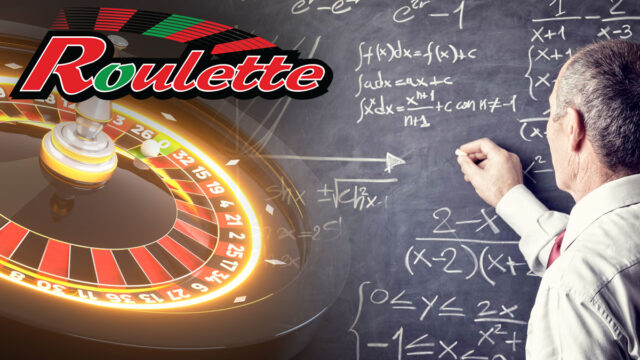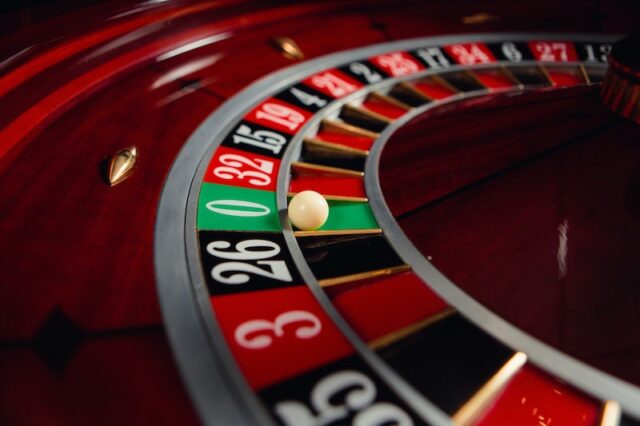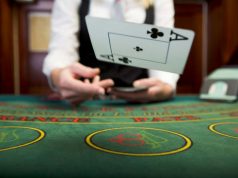
There is an accepted truth about casino games that the house always wins. The vast majority of players are well aware of this fact – it’s not controversial.
Of course, there are games like blackjack and poker that involve skill, and gifted players may turn the odds in their favor, but the true games of chance have a mathematical advantage built into them. And when someone thinks of a game of chance, they are sure to have roulette at top of the list.
Roulette’s probabilities are quite easy to understand. Indeed, unlike, say, blackjack, it is easy to demonstrate how the house edge (the advantage for the casino) is obtained. It comes from the number of segments on a wheel – 37 (classic European wheel) – compared with the payout (35 to 1 for a straight-up number).
In short, if you placed a dollar on every segment, it would cost you $37, and you would win $36. There are other ways to bet on roulette, for sure, but the straight up bet highlights the advantage of the casino most succinctly.
That house edge is calculated as 2.7% for classic European roulette. This is the same when you play roulette games online, with live dealers online, or in person.
The probabilities are so apparent that anyone with the most rudimentary grasp of mathematics could understand them. No matter which way you look at it – what pattern of bets you use – there is no way to reconcile the fact that the number of segments on the wheel (37) is greater than the reward for an equal bet on each outcome. There is no way to beat that math.
A Constant Charge to Beat the Math

And yet, there are numerous books about beating roulette, websites that are dedicated to roulette systems, and some of the world’s greatest minds have been convinced that they could beat the math. The game has been around for centuries, yet there is no full agreement on its fallibility.
As we have pointed out, the math is as easy as understanding why 2+2 doesn’t equal 5. So why have so many tried to defeat the math? And are they correct in assuming it can be beaten?
The answer is complicated, as you might expect. In most cases, it is not about winning a single round of roulette but designing systems that allow you to win over multiple rounds. In effect, as with the Martingale System (see below), you are not strategizing against the wheel, but in how much you wager and when.
Perhaps the most famous mind that has tried to defeat roulette is Alan Turing, the genius behind breaking the Second World War Enigma Code, as well as the father of modern computer science.
Turing designed equations in a seven-page document that was sold at auction a couple of years ago. Turing did not defeat roulette, as such, but he did have a system that a lot of merit.
We wouldn’t dream of explaining all Turing’s calculations here – or pretend to understand them – but it’s enough to say that his system could lead to big gains in the short term but losses in the long term. “Could” is an important word in that last sentence, because nothing is guaranteed.
Of course, the most famous system in roulette does guarantee wins in the long term, but with a caveat. The aforementioned Martingale System involves placing an even money bet (such as red/black, odd/even), then doubling the wager until it wins.
So, say you start with $10, then the bet loses. Then you place $20, and it loses. Place $40, and it wins. You get $80 for an outlay of $70 ($10 + $20 + $40). It’s mathematically sound. However, it is not as attractive as it seems.
You can only win an amount equal to the first bet. And the longer it goes on with losing bets, the more risky it becomes. Why? Because roulette tables have limits. And you might not be able to keep doubling the bets.
The Answer May Lie in Chaos Theory
Source: 888casino.comGetting back to the geniuses, and you’ll often hear tales of university groups tackling casino games to defeat the system, including the MIT team that took in the casinos in blackjack, which was the inspiration for the movie 21.
The most intriguing one in terms of roulette, though, was a group of Chinese scientists who applied chaos theory to the game – and won. Chaos theory is complicated, of course, but the scientists, broadly speaking, were able to predict with relative accuracy where the ball would land on the wheel based on its entry point, the motion and speed of the wheel, and other factors.
Of course, the vast majority of us are not scientists, and we would probably end up losing a lot more than we won should we try to apply chaos theory. But some have tried to bend the rules – or cheat – to beat the system.
Sure, there are all sorts of stories about people using tools like magnets to game the system, but modern technology has also helped. Such was the case in 2004 in London when a gang of scammers decided they would take some of the world’s most famous casinos, including the Ritz, for over £1.2 million ($1.5 million). How did they do it?
They used lasers hidden inside a mobile phone (this was long before anyone had used the term smartphone) that scanned the roulette wheel, relaying the information back to a computer that would pinpoint the likely region where the roulette ball would land.
Remember, in roulette you don’t need to be exact: you can turn the odds in your favor if you know the rough area where it will land; hence the gang walking out with a fortune. Unfortunately for them, the police got involved, and they were soon arrested.
Conclusion

So, we have arguably demonstrated that roulette is not infallible. Mathematicians, scientists, and scammers have all beat the system. Those of us not blessed with genius intellect or expensive scanning equipment can use systems – and there are many being constantly discussed and dissected – that may offer some advantage.
However, just as roulette is flawed, so are all the means of defeating it. There is no correct way to play roulette, and that sense of enigmaticness is the reason the game has dazzled great minds like Alan Turing.
But probably best to leave you with the words of Albert Einstein, who proclaimed that nobody can make money from roulette unless “he steals the money from the table when the croupier isn’t looking.”.













